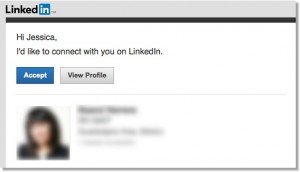Haven’t Landed a Job Yet? Maybe Because You Do Things Like This…
If you find yourself in job transition and feel like you’re stuck because you just can’t land that interview…or maybe you are the other candidate who doesn’t get the job offer, then do a quick gut check and make sure you aren’t doing any of the things described in this blog. Or, if you are on the other side of the recruiting process and reviewing applicants, you probably have other “no-no’s” to add to this list – please send us your comments!
LinkedIn Contact Hoarding
 Lazy LinkedIn Invitations to ConnectI put this one first because it is one of the behaviors that I detest the most…when people you do not know invite you to connect on LinkedIn, but are too lazy to change the standard invitation greeting. This should absolutely be personalized, including the reason for wanting to connect, when you don’t know the person you are inviting. Otherwise, what good is it to have one in your network if you don’t know anything about the person when it comes to making introductions, asking for references, etc. From a recruiting standpoint, if you are an applicant inviting a recruiter to connect (and some will accept…while others won’t), use the invite as an opportunity to reiterate your interest in the organization.
Lazy LinkedIn Invitations to ConnectI put this one first because it is one of the behaviors that I detest the most…when people you do not know invite you to connect on LinkedIn, but are too lazy to change the standard invitation greeting. This should absolutely be personalized, including the reason for wanting to connect, when you don’t know the person you are inviting. Otherwise, what good is it to have one in your network if you don’t know anything about the person when it comes to making introductions, asking for references, etc. From a recruiting standpoint, if you are an applicant inviting a recruiter to connect (and some will accept…while others won’t), use the invite as an opportunity to reiterate your interest in the organization.
Questionable Application Follow-Up Emails
It can be frustrating to have applied to a position, but then never hear anything back from the employer about your status. You might be tempted to email or phone them to inquire about your chances for an interview. That’s okay, as long as the job listing doesn’t say “no phone calls or emails.” But, if you do email…don’t send messages like these please…



An Obvious Lack of Interview Preparation
Let’s say you do land a phone interview or even an in-person interview. Make sure you actually do research on the company and have a sense for the products and/or services offered by the organization. Doing some homework in advance will make you more likely to shine in the interview. Not preparing will dramatically shorten the length of your interview and remove any chances of being considered for other future positions at that company. An important part of adequate preparation includes having a list of your own questions to ask the interviewers during the session. Most interviewers will give you a chance to turn the question tables and if you don’t have any you just end up looking bad.
Bitter Twitter Rants
Unless you have your Twitter privacy settings configured to show your tweets only to your followers, be careful what you type in on your smartphone next time…



Weak Answers to Employment Application Questions
Many employers now have electronic employment applications that you use to indicate your interest in a specific position. Many of them, as a part of the company’s applicant tracking system, will ask questions specific to the job. These questions are a great opportunity to stand out as an applicant with a thoughtful, relevant answer. Just don’t stand out for the wrong reasons…

Failure to Personalize Your Resume to the Position Sought
Since you are seeking a job, its understandable that you are probably applying many different places. If you think you are being efficient by using the same resume for every single application, then you’re mistaken because recruiters don’t want to see an objective statement that describes industries/position types that don’t come remotely close to the job for which they are sourcing applicants. Take the time to customize parts of your resume for the employers receiving it so that it doesn’t go into the reject pile instantly.

Looking for a job is a job in itself. Don’t make it harder by committing these no-no’s and erasing your chances for serious consideration by talent acquisition professionals.
ExactHire provides software suited to help organizations improve the efficiency and quality of their recruiting process. For more information about our web-based products, please contact us or visit our resources section.
Image credit: Tapping a Pencil ![]() by Rennett Stowe(contact)
by Rennett Stowe(contact)
